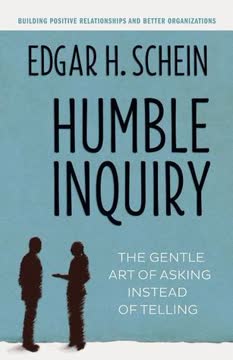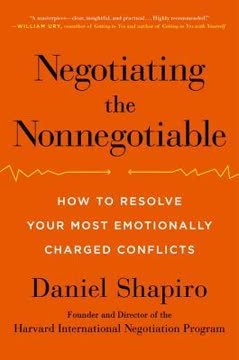Key Takeaways
1. Emotions are Inevitable Assets: Embrace their power in negotiation.
We cannot stop having emotions any more than we can stop having thoughts.
Emotions are constant. Whether positive or negative, emotions are always present in negotiation, affecting both you and the other party. Trying to ignore them is futile and can be detrimental, as they influence your body, thinking, and behavior, often outside conscious awareness.
Obstacles and assets. Emotions can derail negotiations by diverting attention, damaging relationships, or making you vulnerable to exploitation. However, they can also be powerful assets, providing crucial information about priorities and interests, building rapport, and motivating creative problem-making and stable agreements, as seen in President Carter's Camp David negotiations.
Beyond rational argument. Negotiation is not purely a rational exercise; it involves both head and gut. Recognizing and strategically using emotions, rather than being controlled by them, is essential for effective and comfortable interactions, leading to wiser outcomes.
2. Address Core Concerns, Not Just Emotions: Focus on underlying human needs.
Rather than getting caught up in every emotion you and others are feeling, turn your attention to what generates these emotions.
Go to the source. Instead of trying to identify and manage the myriad of constantly changing emotions, focus on the five core concerns that stimulate most feelings in negotiation. These are universal human wants that, when addressed, generate positive emotions and mitigate negative ones.
Five core concerns:
- Appreciation: Feeling understood and valued.
- Affiliation: Sense of connection with others.
- Autonomy: Freedom to make and affect decisions.
- Status: Standing compared to others.
- Role: Having a personally fulfilling job or part to play.
Lens and lever. These core concerns serve as a lens to understand the emotional landscape of a negotiation during preparation, conduct, and review. More importantly, they act as levers, providing concrete actions you can take to proactively stimulate positive emotions in yourself and others, regardless of their current emotional state.
3. Cultivate Appreciation: Understand, value, and acknowledge others (and yourself).
To appreciate is a verb.
More than thanks. Appreciation involves actively understanding another's point of view, finding genuine merit in their thoughts, feelings, or actions, and communicating that understanding sincerely. This is crucial because feeling unappreciated is a significant obstacle to cooperation.
Three elements:
- Understand their point of view: Listen actively, look for "music" and "meta-messages."
- Find merit: Look for value in their reasoning or beliefs, even if you disagree; act like a mediator.
- Communicate understanding: Demonstrate you've heard and valued their perspective through words and actions.
Appreciation is not concession. Finding merit in someone's view does not mean agreeing with them or giving in. It means recognizing the validity of their perspective from their standpoint. Self-appreciation is also vital; don't rely solely on others for validation.
4. Build Affiliation: Transform adversaries into colleagues through connection.
If we feel affiliated with a person or group, we experience little emotional distance.
Connectedness matters. Affiliation is the sense of emotional closeness or connection with another person or group. When negotiators feel affiliated, they are more likely to trust, cooperate, protect each other's interests, and work jointly towards mutually beneficial outcomes.
Structural and personal links:
- Structural: Find or build common group memberships (e.g., colleagues, alumni, shared interests). Treat the other person as a colleague from the outset.
- Personal: Reduce emotional distance through face-to-face meetings, discussing things you care about (within comfortable boundaries), and maintaining contact.
Overcoming adversarial assumptions. The default assumption in negotiation is often adversarial, hindering collaboration. Proactively building affiliation, even through small gestures like sitting side-by-side or planning joint activities, can shift the dynamic from opposition to partnership, as demonstrated in the successful Peru-Ecuador border negotiations.
5. Respect Autonomy: Empower yourself and others to make decisions.
Each of us wants an appropriate degree of autonomy.
Freedom to decide. Autonomy is the fundamental human desire to have the freedom to affect or make decisions without undue imposition from others. Impinging on someone's autonomy, even unintentionally, can quickly trigger negative emotions like resentment and anger.
Expand your autonomy. Even without formal decision-making authority, you have significant autonomy to influence outcomes. You can make recommendations, invent options by separating brainstorming from deciding (like Roger Fisher did during the Iran hostage crisis), and conduct joint brainstorming sessions.
Avoid impinging on others. Unilateral decisions, even on minor issues, can offend others if they feel excluded from a process they should have been part of. Always Consult Before Deciding (ACBD) or at least Consider Consulting Before Deciding (CCBD) with those affected, including "invisible" stakeholders, to respect their input and avoid negative emotional fallout.
6. Acknowledge Status: Recognize worth and expertise beyond social hierarchy.
There is no need to compete over status.
Standing and influence. Status refers to our standing compared to others, influencing both self-esteem and how others view us. Competing for status is counterproductive in negotiation, leading to resentment and hindering collaboration.
Social vs. particular status:
- Social status: General standing in a social hierarchy (fame, wealth, position). Treat everyone with courtesy regardless of social status.
- Particular status: Standing within a specific field of expertise or experience (e.g., technical skill, life experience, negotiation knowledge). Everyone has areas of high particular status.
Recognize and appreciate. Acknowledge and appreciate the other person's high particular status where deserved, without diminishing your own. Asking for advice is a powerful way to do this. Be aware of "status spillover," where status in one area is given undue weight in another.
7. Choose Fulfilling Roles: Define your purpose and activities in the interaction.
We all have a concern with having a role that is personally fulfilling.
Purpose and meaning. A fulfilling role has a clear purpose, is personally meaningful, and feels authentic, not like a pretense. Unfulfilling roles can lead to resentment and disengagement.
Conventional and temporary roles:
- Conventional: Commonly accepted roles (e.g., manager, parent, lawyer). You can shape the activities within these roles to make them more fulfilling.
- Temporary: Roles you choose to play in the moment (e.g., listener, problem solver, advisor). These are easy to adopt and can foster collaboration.
Shape your role. Don't passively accept an unfulfilling role. Become aware of the roles you play and redefine the activities within them to better meet your core concerns. Appreciate the roles others want to play and suggest temporary roles that foster joint work, like shifting from adversaries to colleagues.
8. Manage Strong Negative Emotions: Prepare for and constructively address intense feelings.
Strong negative emotions are like a snowball rolling down a hill. They get bigger as they roll along.
Be ready for intensity. Strong negative emotions like anger or fear can cause tunnel vision, making clear thinking difficult, and can lead to regrettable actions. They are contagious and escalate quickly, so readiness is crucial.
Emergency plan:
- Check emotional temperature: Assess if your emotions are manageable, risky, or out of control.
- Soothe yourself: Have pre-chosen techniques (deep breaths, breaks, visualization) to calm down.
- Soothe others: Appreciate their concerns, suggest breaks, or change the setting or players if needed.
Purposeful expression. If you express strong negative emotions, know your purpose: getting them off your chest (carefully, perhaps to a third party), educating others about impact, influencing behavior (with caution), or improving the relationship (clarify intentions, apologize if needed). Avoid blaming and stay on topic.
9. Prepare Thoroughly: Focus on Process, Substance, and Emotional Readiness.
Prepare. Prepare. Prepare.
Preparation reduces anxiety. Lack of preparation is a major reason negotiators struggle. Effective preparation covers process, substance, and emotions, significantly reducing anxiety and increasing the likelihood of a positive outcome.
Three areas of preparation:
- Process: Define the meeting's purpose, desired product, and a suggested sequence of events (e.g., clarify interests, generate options, decide).
- Substance: Analyze the seven elements of negotiation (interests, options, alternatives, criteria, commitments, communication, relationship) from both sides' perspectives. Use role reversal to test your arguments.
- Emotion: Use core concerns as a lens to anticipate sensitivities and as a lever to plan positive actions. Visualize success and practice self-soothing techniques.
Learn from experience. Don't let hard-earned lessons fade. Review negotiations promptly after they end, alone or with colleagues, focusing on "What Worked Well" and "What to Do Differently" regarding emotions, process, and substance. Keep a journal to record insights and build your personal negotiation guide.
Last updated:
FAQ
What is Beyond Reason: Using Emotions as You Negotiate by Roger Fisher and Daniel Shapiro about?
- Emotions in negotiation: The book explores how emotions, often overlooked or seen as obstacles, are always present and play a powerful role in negotiation outcomes.
- Core concerns framework: It introduces five core concerns—appreciation, affiliation, autonomy, status, and role—that underlie emotional responses and drive negotiation dynamics.
- Practical application: Through real-world examples, the authors show how understanding and managing emotions can transform negotiations into more collaborative and productive dialogues.
- Systematic approach: The book provides a structured method for stimulating positive emotions and managing negative ones to improve both agreements and relationships.
Why should I read Beyond Reason by Roger Fisher and Daniel Shapiro?
- Unlock emotional power: The book reveals how harnessing emotions can lead to better agreements and stronger relationships, making negotiations more effective.
- Proven framework: Readers gain a structured way to address emotional dynamics, avoiding the confusion of dealing with every individual feeling.
- Broad applicability: The strategies are relevant for negotiations at work, at home, or in high-stakes international settings.
- Reduce stress and conflict: The advice helps negotiators avoid emotional pitfalls, build trust, and foster collaboration.
What are the key takeaways from Beyond Reason: Using Emotions as You Negotiate?
- Emotions are central: Emotions, not just logic, drive negotiation outcomes and must be addressed for success.
- Five core concerns: Appreciation, affiliation, autonomy, status, and role are universal drivers of emotional reactions in negotiation.
- Constructive strategies: Addressing these core concerns can stimulate positive emotions and manage negative ones, leading to better results.
- Relationship focus: The book emphasizes building respect and understanding, improving both the negotiation process and long-term relationships.
What are the five core concerns in Beyond Reason and why are they important?
- Appreciation: Feeling valued and understood is fundamental; lack of appreciation leads to negative emotions and resistance.
- Affiliation: Humans need to feel connected and included; building affiliation turns adversaries into colleagues and eases collaboration.
- Autonomy: The desire for freedom in decision-making; respecting autonomy prevents resentment and promotes engagement.
- Status: Recognition of one’s standing and expertise; acknowledging status enhances self-esteem and influence without competition.
- Role: Having a meaningful and authentic role; shaping roles reduces frustration and increases motivation during negotiation.
How does the core concerns framework from Beyond Reason by Roger Fisher and Daniel Shapiro work in practice?
- Focus on underlying needs: Instead of managing every emotion, address the five core concerns that generate most emotional reactions.
- Stimulate positive emotions: Meeting core concerns like appreciation and affiliation creates a positive climate for agreement.
- Prevent negative spirals: Ignoring or violating core concerns can escalate conflict and derail negotiations.
- Universal application: The framework is effective across personal, business, and international negotiation contexts.
How does Beyond Reason recommend dealing with strong negative emotions during negotiation?
- Recognize emotional temperature: Be aware of your own and others’ emotional states to prevent escalation and loss of control.
- Have an emergency plan: Prepare soothing techniques such as deep breathing, taking breaks, or changing the setting before emotions arise.
- Purposeful expression: Decide why you want to express strong emotions—venting, educating, influencing, or improving relationships—and tailor your response accordingly.
- Avoid venting pitfalls: Unmoderated venting can escalate conflict; consider writing unsent letters or using a third party to process feelings.
What is the significance of appreciation in negotiation according to Beyond Reason?
- Foundation of positive emotions: Appreciation involves understanding another’s point of view, finding merit in their thoughts or actions, and communicating that understanding sincerely.
- Builds trust and cooperation: Expressing appreciation, even in disagreement, fosters respect and openness, making agreement more likely.
- Practical techniques: The book recommends active listening, reflective statements, and role reversal exercises to better understand and express appreciation.
- Not about conceding: Appreciation means recognizing legitimacy, not necessarily agreeing or giving in.
How does Beyond Reason by Roger Fisher and Daniel Shapiro suggest building affiliation in negotiation?
- Reduce emotional distance: Building affiliation transforms adversaries into colleagues, making collaboration easier and more productive.
- Structural and personal connections: Establish shared group identities and personal ties through joint activities and informal meetings.
- Balance affiliation: Maintain professional boundaries to avoid manipulation or over-identification while fostering trust.
- Use affiliation strategically: Turning opponents into colleagues opens pathways for collaborative problem-solving.
What advice does Beyond Reason give about respecting autonomy in negotiation?
- Expand your own autonomy: Influence decisions by making recommendations, brainstorming options, and preparing well, even without formal authority.
- Respect others’ autonomy: Always consult or inform others before making decisions that affect them to prevent negative emotions and resistance.
- I-C-N bucket system: Categorize decisions into Inform, Consult, or Negotiate to clarify authority and respect autonomy appropriately.
- Prevent reactance: Respecting autonomy reduces resistance and increases engagement in negotiation.
How does Beyond Reason explain the importance of status in negotiation?
- Affects esteem and influence: Recognizing and respecting social and particular status enhances cooperation and communication.
- No need for rivalry: Acknowledge each person’s strengths and expertise without competition, as everyone has areas of high status.
- Beware status spillover: Ensure that status in one area does not unduly influence decisions in unrelated areas.
- Raise and respect status: Sincerely recognize others’ status and take pleasure in your own expertise to build positive dynamics.
How can negotiators shape and choose fulfilling roles according to Beyond Reason?
- Awareness of roles: Understand your formal job title and associated activities, but recognize these are often flexible and incomplete.
- Redefine activities: Add, modify, or delete tasks to make your role more fulfilling and aligned with your core concerns.
- Adopt temporary roles: Take on roles like listener, problem solver, or mentor strategically to foster collaboration and meet situational needs.
- Help others with roles: Appreciate the roles others want to play and suggest temporary roles to facilitate better negotiation outcomes.
What are the best quotes from Beyond Reason by Roger Fisher and Daniel Shapiro and what do they mean?
- “When angry, count to ten before you speak; if very angry, a hundred.” — Thomas Jefferson: This quote highlights the importance of self-soothing and emotional regulation in negotiation.
- Context in negotiation: Taking time before reacting helps prevent impulsive responses that can damage relationships and derail agreements.
- Book’s emphasis: The authors stress having an emergency plan to manage strong negative emotions, including techniques like counting or deep breathing.
- Practical takeaway: Emotional control is essential for maintaining productive dialogue and reaching successful agreements.
Review Summary
Beyond Reason receives mostly positive reviews, with readers praising its practical approach to managing emotions in negotiations. Many find the book's framework and examples helpful for both professional and personal relationships. Some reviewers note that the content is applicable beyond formal negotiations, extending to everyday interactions. Critics mention that the book may contain similar information to other negotiation texts or feel repetitive. Overall, readers appreciate the emphasis on understanding and addressing emotions in various situations, from business deals to family discussions.
Similar Books










Download PDF
Download EPUB
.epub digital book format is ideal for reading ebooks on phones, tablets, and e-readers.






